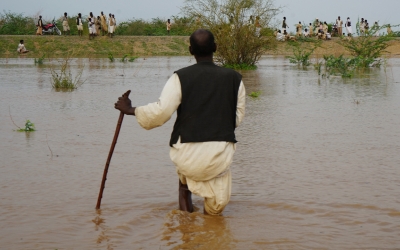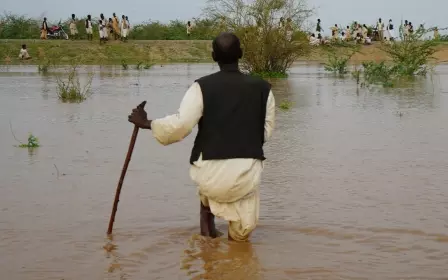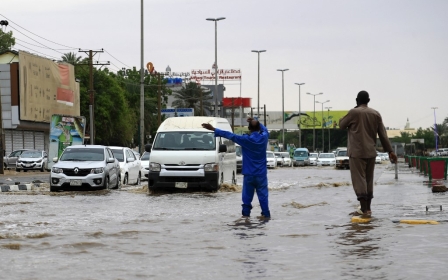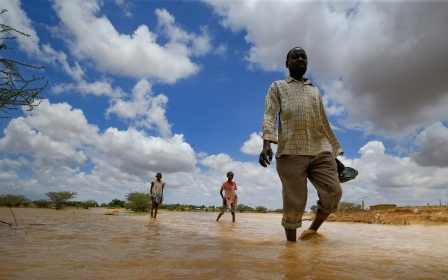Sudan floods: Army and opposition in blame game as scores left dead
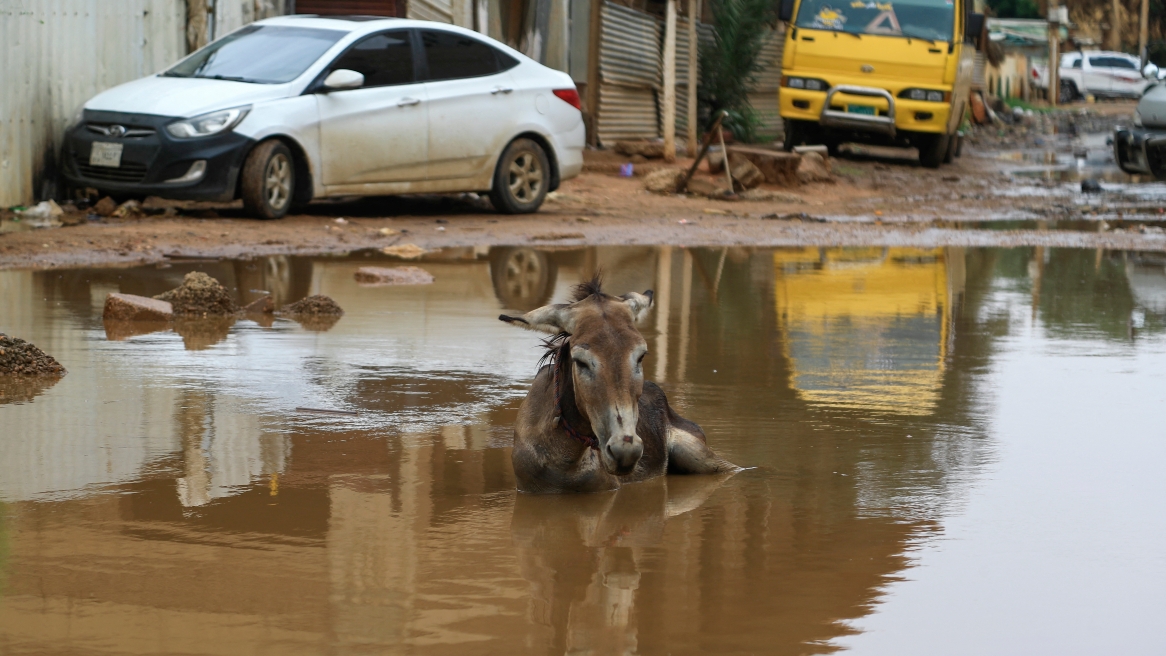
The family of Ibrahim Alamir is just one of hundreds who are now stranded in a village in Al Managil in Al Jazirah state, their house destroyed and with little supplies left, following torrential rains and flash floods in Sudan.
Alamir, who lives with his wife, mother and six children, told Middle East Eye that people were now forced to live on the streets without any shelter.
“The situation is too bad, we experienced the worse scenario from the impact of this rainy season," he said.
"We lost our properties as we saw our furniture floating on the floods. We are suffering from a shortage of food and other basic needs.”
Nasr Ahmed, a resistance committee member in his early twenties, said: "We are helping the old women, and other vulnerable people.
New MEE newsletter: Jerusalem Dispatch
Sign up to get the latest insights and analysis on Israel-Palestine, alongside Turkey Unpacked and other MEE newsletters
“We have been cut off by water from every direction and are suffering from the health and environmental effects."
Torrential rains usually fall in the east African country from June to October, causing severe flooding every year, wrecking properties, infrastructure and crops.
This year's flooding has left scores of people dead and thousands homeless, as seasonal torrential rain engulfs large parts of the country.
Places like Al Managil have become completely inaccessible, while authorities have declared emergencies in areas including River Nile, Kassala and parts of Darfur.
Among the areas worst affected are the internally displaced persons (IDPs) camps in Darfur where people hit by the rain have received no help, Adam Regal, a spokesperson for the General Coordination for Refugees and Displaced in Darfur, told MEE.
“The IDPs camps, especially the Kalma camp in South Darfur state, have been seriously impacted, leading to the death of three children and the collapse of nearly a thousand houses,” he said.
Meanwhile, opposition groups and resistance committees have heavily criticised the country's military leadership, which took power in October in a coup, for its response to the crisis.
Critics say it failed to prepare for the rainy season, has done little to tackle the aftermath, has neglected citizens, and should have declared the whole of Sudan as an “emergency area”.
With river levels continuing to rise, there are now fears that the capital Khartoum could be the next area to face disaster.
Food insecurity
In a statement on Monday, the UN Office for the Coordination of Humanitarian Affairs (OCHA), said 15 out of 18 Sudanese states continue to be affected by floods and flash floods.
The OCHA said at least 89 people had died since the start of the rainy season and more than 30 people had been injured.
About 226,200 people have been affected across the country, according to the organisation, including 45,270 in Al Qadarif State, 39,448 in Central Darfur, 30,677 in South Darfur, 26,592 in White Nile, and 25,890 in Kassala.
Flooding has destroyed at least 13,200 houses and damaged another 34,200.
“The floods have reportedly affected at least 500 health facilities, 1,000 water sources and over 2,500 latrines have been damaged or destroyed," the statement said.
"People have lost over 740 head of livestock and over 12,000 feddans (over 5,000 hectares) of agricultural land were affected by floods, which will contribute to already worrying levels of food insecurity.”
Brigadier General Abdul-Jalil Abdul-Rahim, spokesman for Sudan’s National Council for Civil Defence, told MEE that nearly a hundred villages in Al Jazirah, Kassala and River Nile states were now inaccessible.
Abdul-Rahim also called on neighbouring countries and others around the world to help.
“As the rain and floods may also hit the capital Khartoum in the upcoming days, we can’t deliver all that is needed sometimes," he said.
"We have put all our forces on standby in different locations, especially on the two banks of the River Nile, where thousands of people are living in the path of the water.”
Abdul-Rahim said the water levels along the Nile and Atbara rivers were still increasing as the peak of the rainy season approached.
On Saturday, water levels at water stations in Khartoum and Atbara, located around 300km northeast of the capital, were recorded at 16.75 metres and 15.88 metres respectively, both exceeding flooding risk levels.
In 2020, flood water swelled the Blue Nile, which joins the White Nile in Khartoum, to its highest level since records began over a century ago.
Blame game
Meanwhile, the military leadership and opposition have traded accusations over responsibility for the disaster and the response to it.
The Forces for Freedom and Change (FFC), Sudanese Professional Association (SPA) and civil society organisations have all accused the government of failing to prepare adequately for the autumn season.
In a statement, the SPA said the effects of the floods was just one example of many, including the economy, of how the military had failed to act since October
“We are not surprised that the current regime which killed the pro-democracy protesters in the streets because of their demands for civilian rule, that they will ignore saving them from dying because of the rainy season and health and environmental impacts,” the SPA said.
Resistance committees in different parts of the country said they had called for a mobilisation of their members to help the people in the absence of government help.
“We are urging all our members in different parts of Al Managil locality to stand in solidarity with their people, help them, and raise the popular solidarity among our community," said the Gazira state resistance committee.
"Our people are in need of shelters, food, clean water and other assistance.”
In response, coup leader General Abdel Fattah al-Burhan accused the opposition and civilian group of entering into a power struggle at the expense of the people.
Addressing a public rally in White Nile State earlier this month, Burhan called on the different political groups to sit together for talks to achieve national unity and to form a civilian cabinet.
“The political parties have wasted more than two years in competition and sideline conflicts... and as we see that our people are suffering," he said.
"So, we urge them again to sit and agree on the basis of national unity to form a new cabinet and lead this country in order to lift the suffering of our people.”
Middle East Eye delivers independent and unrivalled coverage and analysis of the Middle East, North Africa and beyond. To learn more about republishing this content and the associated fees, please fill out this form. More about MEE can be found here.


